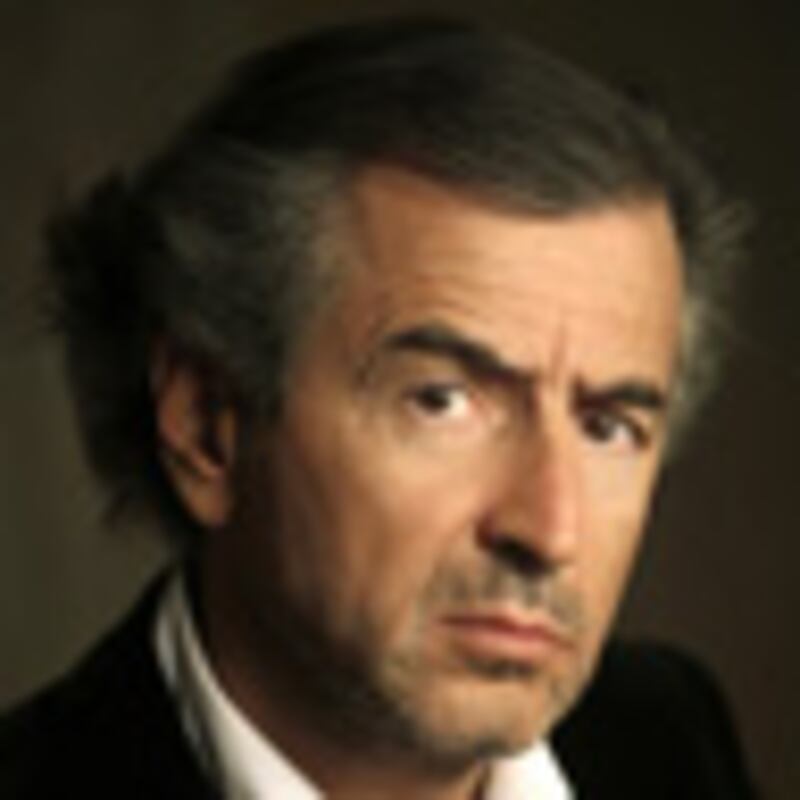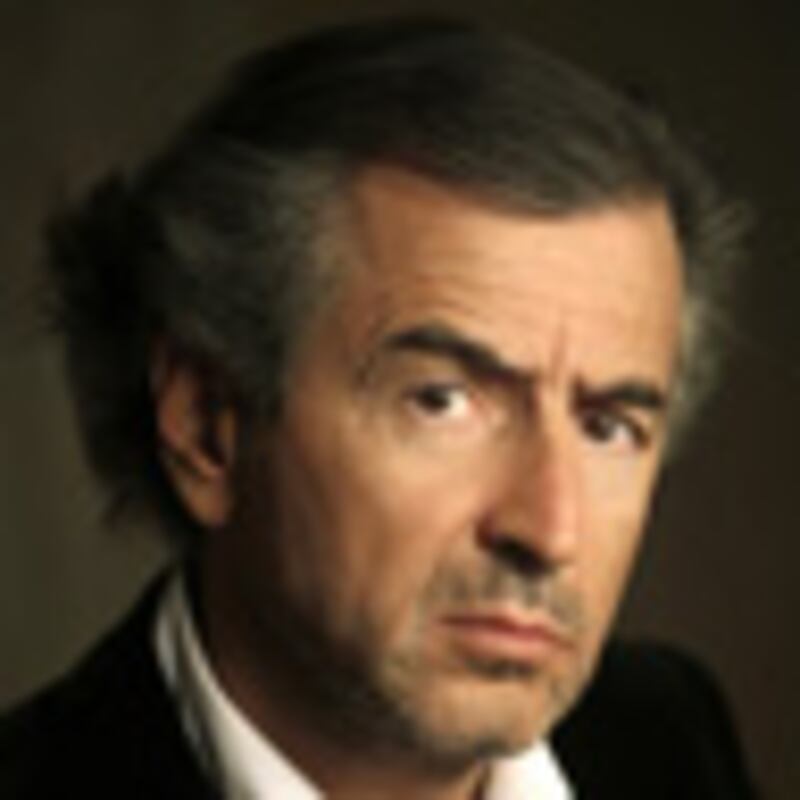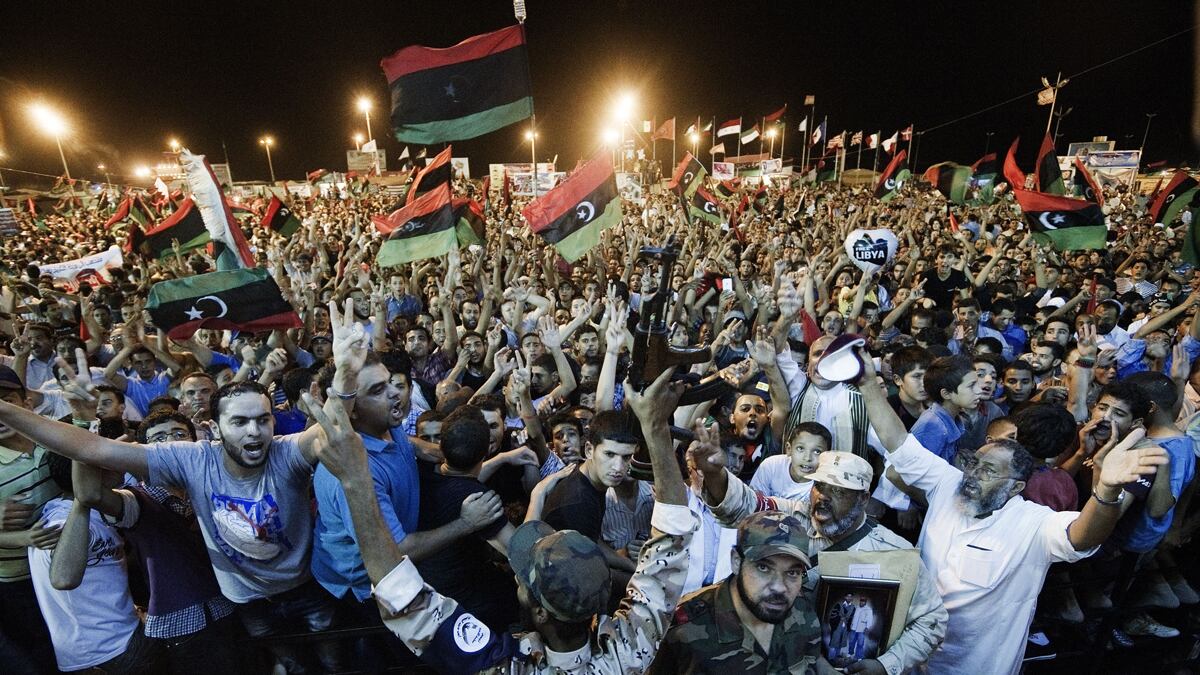
Babak Dehghanpisheh visited a Gaddafi family home this morning and discovered a secret palace hidden behind an ordinary façade. Read about the garden labyrinth, 40-foot deep bunker, hot tub, waterfall, Playboy magazine collection, yachting brochures and an empty box of Coronas.
The neighbors always knew they would be surprised by what’s inside the house on Dhel, or shadow, street. But when they got the first glimpse of Muammar Gaddafi’s house in southeast Tripoli last Sunday, they were in complete shock. “It’s amazing. We didn’t believe [it],” says Hassan Salem, a 46-year-old engineer who lives in the neighborhood. “We thought we are in a dream.”

Inside Gaddafi’s CompoundBy David GrahamThe dictator’s last stronghold, which rebels overtook Tuesday, is as mercurial as its owner. David A. Graham maps out the mosque, the soccer field—and the Bedouin tent that Gaddafi sleeps in.The last major bastion of Muammar Gaddafi’s 42-year-old regime has fallen, as rebels overran the colonel’s Bab al-Aziziya compound in Tripoli Tuesday, uncovering large caches of weapons—but so far, no sign of the mercurial dictator, who had been expected to hunker down there for a final stand.

By Goffrey Robertson Libya’s rebels are celebrating Gaddafi’s impending fall, but Western leaders should resist the temptation to let them visit their revenge on the dictator. He should be sent to The Hague so he can be held responsible for the full measure of his crimes against humanity.The fall of a tyrant—or of a tyrant’s son and heir—is usually the cause of popular rejoicing followed by public vengeance. They are hung from lampposts (the fate of Mussolini and his mistress) or rushed to kangaroo courts for pre-determined death sentences (see President and Mrs. Ceausescu in Romania). But it is just possible, should Col. Muammar and Saif Gaddafi be taken alive, that we are entering a new and better era in which tyrants and their spawn will instead be dispatched to The Hague for fair trial in an international court for their crimes against humanity.

Libya Wins One for Freedomby Bernard-Henri Lévy
Bernard-Henri Lévy pays homage to Sarkozy’s gamble, the U.S. and European airmen—and above all the Libyan rebels, who have written a new page in the history of their country.
We’ve heard it all!
They were getting bogged down in this war.
The insurgents were disorganized, undisciplined, lightweights.
The National Transitional Council was divided, torn by factional rivalry, tribalized.
______________________________________________________

Italy’s Next Act in Libyaby Barbie Latza Nadeau
With rebels set to seize Tripoli, the Italians are leveraging their frontline status and long history with Libya to forge a key role in a post-Gaddafi—and oil-rich—nation, says Barbie Latza Nadeau.
More than 50,000 North African refugees have crashed their rickety fishing boats on the shores of the tiny Italian island of Lampedusa since January, and more than half of those set sail from Libya. Initially, many of the refugees were of sub-Saharan African origin, pushed out of Libya by Muammar Gaddafi’s forces as a form of retaliation against Italy for its part in NATO airstrikes against Tripoli’s forces that began last March. Gaddafi promised to “turn Europe black” to “teach them a lesson.” But in the last month, the faces on the boats have been mostly Libyan, and Italians are increasingly worried that many are Gaddafi fighters with terrorist ties. Italy has stepped up security and screening in recent days, and many of the boats are met by Italian Coast Guard ships. Some have been hauled back to Libyan waters after women and children are removed.
______________________________________________________

Libya War’s Unsung Heroesby Clive Irving
While ragtag fighters duked it out on the ground, an elite crew of NATO planes ran the show from the sky. Clive Irving on the rebels’ secret weapon.
Somewhere high over the Mediterranean right now, a small crew of military specialists sits hunched over computer screens aboard a cruising jet. They could be American, British, or French. Since March they have been the commanding brains of the NATO mission against Muammar Gaddafi’s forces in Libya. Largely unseen and unsung, they are as responsible as anyone for Gaddafi’s defeat.
______________________________________________________

5 Great Opinion Pieces on Libyaby David A. Graham
As Libya’s uprising roars to a climax, The Daily Beast rounds up five of the best opinion reads on the unfolding drama—from why we should be hopeful to why conservatives are squirming.
Libyans deserve a moment to rest on their laurels and enjoy their success—but it had better be a quick moment, Faisal Al Yafai writes in Abu Dhabi’s The National. Yafai goes on to deliver a lengthy litany of the struggles the country will face. “These are dangerous times for Tripoli and for Libya. Dangerous in a small sense, because there are lots of hyped-up, excited young men with guns on the streets of Tripoli, far from their home in the east. Dangerous, too, because the regime has not yet surrendered. There are pockets of resistance in Tripoli, many heavily armed, and unknown snipers.” And that’s just the short term: the days ahead will see the fractious Transitional National Council tested; a new template for government demanded; and potentially, Gaddafi’s judicial fate decided. Yafai’s advice? “Having come this far, keep calm and keep going.”
______________________________________________________

Inside the Rebel Endgameby Fadel Lamen
How did Tripoli fall so suddenly? The Daily Beast’s Fadel Lamen, who was with rebel leaders in Libya last week, reveals their strategy, and a secret plea from a Gaddafi deputy.
Having spent the past two weeks with rebel leaders in Libya, as well as in Tunisia and Egypt, where more opposition leaders bide their time, I am less surprised than most by the rapid assault on Tripoli and the seemingly imminent collapse of Gaddafi.
______________________________________________________

Gaddafi Goons Dig Inby Babak Dehghanpisheh
Triumphant rebels have taken over most of Tripoli, but pockets of resistance could still push them back. Babak Dehghanpisheh on Gaddafi’s dwindling options—and where he may be hiding.
The last stand of the madman of the Sahara didn't turn out to be much of a last stand at all. Like many a dictator before him, Muammar Gaddafi went out like a paper tiger, his threats to slaughter the rebel forces like “rats” just bombast and hot air. Rebel forces in western Libya stormed into Tripoli Sunday night after a lightning-fast assault from the town of Zawiyah, some 25 miles outside the capital. After midnight, rebel fighters were waving their tricolor flag in Tripoli's central Green Square, which they renamed Martyr’s Square, cheered on by some of the city’s residents. Around them, portraits of Gaddafi lay in tatters.
______________________________________________________

The Gaddafi Exit Strategyby Eliza Griswold
Tripoli has fallen and the dictator’s jets are fueled—but where’s Muammar Gaddafi going? Eliza Griswold on his options, from a sanctuary with Chávez in Venezuela to becoming part of a killer troika in Zimbabwe.
Whither Gaddafi?
Two planes are reportedly waiting on the runway at Tripoli’s airport to carry off Muammar Gaddafi to places unknown, according to Al Jazeera.
______________________________________________________

After Gaddafi, What Next?by Babak Dehghanpisheh
Tripoli has fallen, but Babak Dehghanpisheh reports that the Libyan rebels' infighting and brutality toward their own side suggests they may not be ready to lead.
After months of seesaw battles in the Sahara Desert, Libya's rebels are now making their first serious push to Tripoli. Rebel fighters reportedly captured Jaddayim on Sunday, which places them only 25 miles away from the capital, where fighting has already kicked off. Late on Saturday, fierce clashes broke out in several neighborhoods in Tripoli and sporadic explosions and gunfire continued throughout the night, according to the Associated Press. Officials in Benghazi, the de facto rebel capital in the east, say they are coordinating with fighters' cells, which have been keeping a low profile and waiting for the right moment to strike in Tripoli. Large antigovernment protests also broke out in Tripoli on Sunday, suggesting that protesters had been waiting for the right moment to rise up and hit the streets, too. The conflict finally appears to be approaching an endgame. “The zero hour has started,” said Abdul Hafiz Ghoga, according to Reuters, the vice chairman of the rebel National Transitional Council.
______________________________________________________
Who Killed General Younes?by Hanan Ghosheh
As new details emerge in the death of Libya’s rebel-army chief, the mystery gets only more troublesome. Hanan Ghosheh on the events that led up to the murder and the long shadow it casts on the country’s future.
Even as the Libyan revolution has finally reached Tripoli, the rebels' interim government is beset by unanswered questions about the July 28 murder of the anti-Gaddafi forces’ chief of staff, Gen. Abdel Fattah Younes. So far, no one has been arrested for killing the Gaddafi regime’s former interior minister, whose high-profile defection in February helped transform a protest movement into a full-fledged revolution. And while people in the country’s liberated areas wonder whether the killers will ever be brought to justice, emerging details in the case are raising serious questions about the conduct of the rebels’ National Transitional Council—especially about the actions of the NTC’s chairman, Mustafa Mohammed Abdul Jalil, and its then–deputy foreign minister, Ali Essawi.
______________________________________________________

Stay the Course in Libyaby Bernard-Henri Lévy
Libyan rebel leader Gen. Abdel Fattah Younes was assassinated last week. French philosopher Bernard-Henri Lévy says now more than ever, it’s time to set the "Libyan precedent"—by finishing the job.
Last week’s assassination in Benghazi of Gen. Abdel Fattah Younes, the chief of staff of Libya’s rebel forces, is a major blow and was felt as one by the rebel coalition, which has lost in him an officer they knew well, who was received by Nicolas Sarkozy in Paris, with me, in April. But this is far from the military and political catastrophe it is being made out to be by those in Europe and in the United States who pass up no occasion to discredit the insurgents—the great argument, this time around, being that the muddled circumstances surrounding his assassination, and the uncertainty concerning the identity of those who committed it, is final proof of the structural weakness of the National Transitional Council, and even of the growing power of dissension within its ranks. I firmly reject all of this.
______________________________________________________




